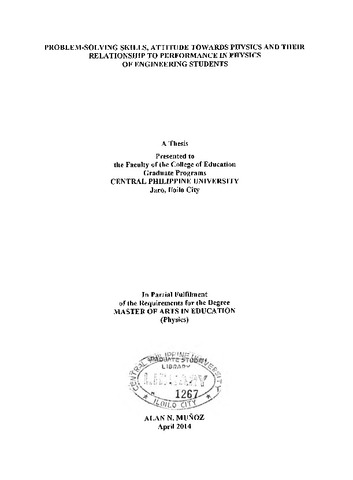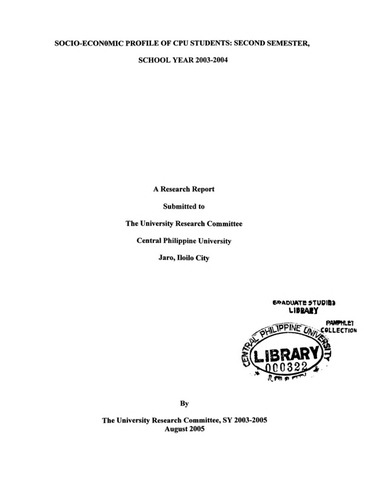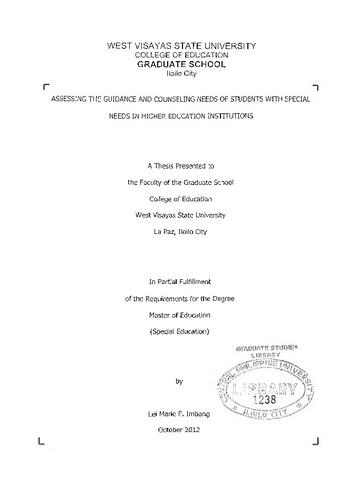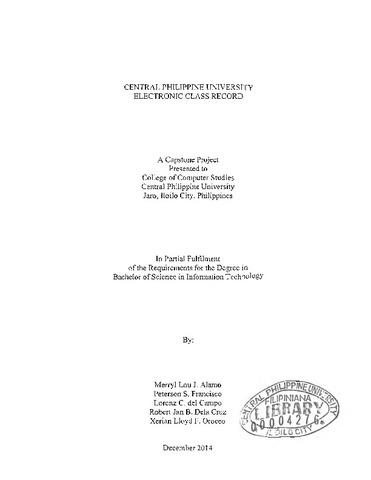Problem-solving skills, attitude towards Physics and their relationship to performance in Physics of Engineering students

Page views
1,401Date
2014-04Auteur
Thesis Adviser
Defense Panel Chair
Share
Metadata
Afficher la notice complète
Résumé
The study aimed to determine the problem solving skills, attitude towards physics and performance in physics of engineering students and the relationship among them.
The descriptive correlation research design was employed in this study. The respondents of the study were one hundred twenty four (124) second year Bachelor of Science in Communication and Electronics Engineering and Bachelor of Science in Electrical Engineering students of Western Visayas College of Science and Technology, Iloilo City.
In this study a “Teacher-Made Problem Solving Test” developed by the researcher, jury validated and pilot tested was used to determine the problem solving skills and performance of engineering students in physics. A “Teacher-Made Rubric” was used to determine the performance of students in each problem-solving skill and an adapted but modified “Attitude Questionnaire” was used to determine the attitude of the students towards physics. Frequency distribution, mean and standard deviation were the descriptive tools utilized in this study.
The Pearson Chi-Square test, Pearson-Product Moment Correlation and Partial Correlation were utilized to investigate the existence and the significance between pair of major variables.
The results of this study revealed that the 124 engineering students have poor performance in physics. They are low in different aspects of problem solving skills and they have negative attitude towards physics The students’ problem solving skills in describing cases and their rate in solving problems are significantly related to their attitude towards physics. Their performance is also significantly related to their attitude towards physics. However, identifying cases, matching cases with principles and mathematical procedures or algorithm are not significantly related to their attitude towards physics. All problem solving skills namely identifying cases, describing cases, matching cases with principle, rate of doing problem solving and mathematical procedures or algorithm are significantly related to the performance of students in physics. There is a positive and very high significant relationship between the performance in physics and problem solving skills when attitude is controlled.
Description
Abstract only
Suggested Citation
Muñoz, A. N. (2014). Problem-solving skills, attitude towards Physics and their relationship to performance in Physics of Engineering students (Unpublished Master's thesis). Central Philippine University, Jaro, Iloilo City.
Type
ThesisSujet
Keywords
Department
School of Graduate StudiesDegree
Master of Arts in Education major in PhysicsShelf Location
GSL Theses 378.242 M926
Physical Description
xiv, 87 leaves
Collections
Related items
Showing items related by title, author, creator and subject.
-
Socio-economic profile of CPU students: Second semester, school year 2003-2004
University Research Committee (Central Philippine University, 2005-08)This survey was conducted in order to determine the profile of the students of Central Philippine University for the second semester of SY 2003-2004. This study was descriptive in nature and employed the survey approach. ... -
Assessing the guidance and counseling needs of students with special needs in higher education institutions
Imbang, Lei Marie F. (2012)The increase in number of students with special needs in higher education institutions necessitates greater understanding of their needs. The purpose of this study was to determine the guidance and counseling needs of ... -
Central Philippine University electronic class record
Alamo, Merryl Lou J.; Francisco, Peterson S.; Del Campo, Lorenz C.; Dela Cruz, Robert Jan B.; Oroceo, Xerian Lloyd F. (2014)This study was designed to develop an Electronic Class Record for Central Philippine University. It focused on the following objectives: provide a synching module that allows the faculty to retrieve and constantly update ...




